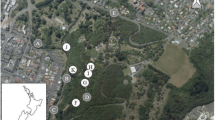Abstract.
The sponge-dwelling shrimp Synalpheus regalis and several congeners exhibit monogynous, eusocial colony structures, and field data suggest that these social species may have a competitive advantage in crowded environments. We explored mechanisms of colony defense, a likely contributor to such a social advantage, by measuring responses of resident shrimp to conspecific and heterospecific intruders in experimental nests. To test for behavioral differentiation among classes of individuals, we compared responses of juvenile, large male, and breeding female (queen) S. regalis to each intruder type. Colony residents discriminated nestmates from both foreign conspecific and heterospecific intruders, making more aggressive snaps and fewer contacts with such intruders than with controls from the same colony. S. regalis colonies also exhibited behavioral differentiation among classes of individuals: most snaps against intruders were by large males. Thus, large males defended the colony, allowing juveniles and the queen to feed and grow unmolested. On a per-individual basis, intruders more frequently contacted the queen than either large males or juveniles, possibly indicating that signals from the queen provide information about colony status as they do in many social insects. Sampling of unmanipulated field colonies showed that colony reproductive output increased linearly, by a factor of 177 times, throughout the range in sampled colony sizes (2–356 individuals), whereas average per capita reproductive output decreased by only 61% over the same range. These data suggest that non-breeding colony members may gain inclusive fitness benefits by remaining in and helping defend the natal sponge. Differentiation among individuals in reproductive and defensive behavior may enhance the efficiency and productivity of S. regalis colonies and contribute to their apparent competitive advantage over less social congeners.
Similar content being viewed by others
Author information
Authors and Affiliations
Additional information
Electronic Publication
Rights and permissions
About this article
Cite this article
Duffy, E.J., Morrison, C.L. & Macdonald, K.S. Colony defense and behavioral differentiation in the eusocial shrimp Synalpheus regalis . Behav Ecol Sociobiol 51, 488–495 (2002). https://doi.org/10.1007/s00265-002-0455-5
Received:
Revised:
Accepted:
Issue Date:
DOI: https://doi.org/10.1007/s00265-002-0455-5




